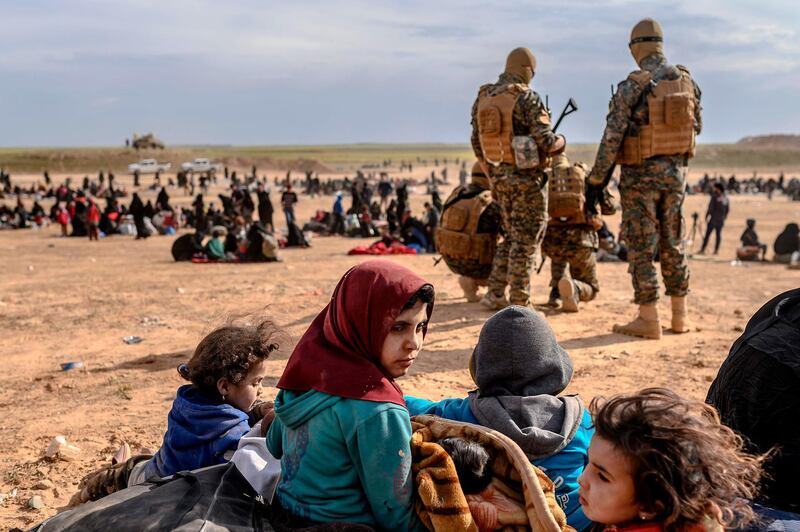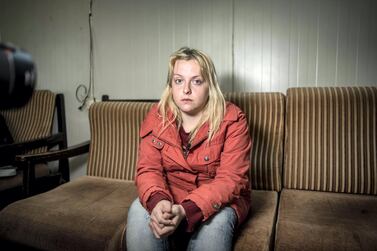For months, Fatima did not receive any response from the French government as she pleaded for her 5-year-old granddaughter to be repatriated from a Kurdish-controlled camp in north-eastern Syria.
The response came earlier this month, when France – unlike other western countries – unexpectedly took the decision to repatriate five orphaned children of ISIS supporters.
Fatima, who withheld her last name, welcomed the news with a sigh of relief. "I was always terrified that they would one day tell me that she was gone, as they did with my son," she said in an interview with French newspaper Le Monde.
Her son Sofiane was 20 years old when he left Paris to join the extremist group in Syria back in 2012. After French authorities reported his death, together with his wife, Fatima contacted Samia Maktouf, a lawyer specialised in helping victims of terrorism, to seek the repatriation of her granddaughter.
"We thought it would be evident to the French government that the girl would have to be brought back," Mrs Maktouf told The National. "Instead it took over a year."
The French government has long avoided bring back children of extremist fighters for both legal reasons and for fear of infuriating the public, according to experts. The return of the five French children on March 15, therefore, surprised many, including their families.
Human rights groups estimate that at least 100 French children are stranded in Iraq and Syria, where ISIS had established a "caliphate" spanning parts of both countries. Determining their eligibility for repatriation, however, is a painstaking job.
Those born under the so-called Islamic State lack legally valid birth certificates or identity documents and their whereabouts may be difficult to ascertain. The combination of evidence Mrs Maktouf had to collect in order to obtain repatriation included photographs of the child received on her phone, information collected by the Red Cross on the child’s whereabouts and, ultimately, conformation from the intelligence services of the identity of the child.
The information was brought to court together with a written request addressed to Foreign Affairs Minister Jean-Yves Le Drian, asking for the child to be allowed back.
The request was followed by a long silence. As the months went by, the last sliver of land held by ISIS came under attack and a stream of dishevelled women and children poured out in search for safety.
Since December, nearly 60,000 have arrived at Al Hawl refugee camp in north-eastern Syria, stretching its capacity to breaking point. At least 29 children have died, mainly from hypothermia, according to the World Health Organisation.
Mrs Maktouf, who represents Fatima as well as another family whose two-year-old boy is trapped in Syria, said the situation meant she could wait no longer. “We decided to take action.”
In December, she sued the French government to force it to comply with international law.
Lawyers Marie Dosé and Henri Leclerc, who also represent families with orphaned children in Syria, referred the case to the United Nations to demand that France upholds its obligations under international law.
Nine countries, including Russia, Egypt and Indonesia, have taken back about 200 children. With the exception of France, western governments have so far demurred.
The Belgian state won an appeal in late February against a ruling ordering it to repatriate six children who are with their mothers in Al Hawl.
Britain also refused to repatriate the children of ISIS militants, until the death of Shamima Begum’s 3-week-old son forced it to start looking into ways of doing this.
The French foreign ministry has not indicated how many children will be repatriated, but said its decision would apply only to “orphan and isolated minors, all aged 5 and less”.
ISIS supporters have been returning to Europe since at least 2015, at times bringing children with them. In February last year the French government sent out a ministerial circular to clarify the rules on the protection and custody of those children.
Like others before her, Fatima’s granddaughter has been placed in a foster family as a court assesses her well-being and Fatima’s suitability as a grandmother. Ultimately, the goal is to reunite her with her biological family, Mrs Maktouf said.
“Many steps must be taken and Fatima is aware of that, she will wait,” the lawyer added.
In all likelihood, the involuntary link to the extremist group will mark the life of these children for years to come. But as some countries like France backtrack and allow for their return, those who are still reluctant will now have a tougher time making a case for inaction.







